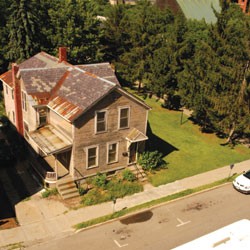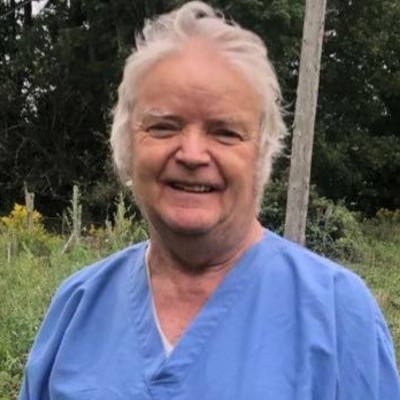
- Matthew Thorsen
- Northern Lights, before renovations in 2000
When Rita McCaffrey founded Vermont’s first Dismas House in Burlington 24 years ago, the big controversy was on-street parking. She recalls the city zoning board expressing concerns that putting former prisoners in transitional housing on Buell Street would make it impossible to accommodate any additional cars in the residential neighborhood.
“It’s hysterical when I think back on it,” says McCaffrey, who recently announced she’s retiring as long-term executive director of Dismas House, which now operates three supportive transitional housing projects in the state. “It was nothing like the NIMBY-ism that has come up now.”
McCaffrey is referring to the “not in my backyard” attitude that has threatened the development of more Dismas-like projects around the state, including one opening in September on Burlington’s Elmwood Avenue. The just-approved Phoenix House will provide intensive drug and alcohol counseling, as well as job support and life skills training, to 20 ex-inmates — around the corner from Church Street.
Opponents of Phoenix House say they are concerned about the facility’s proximity to the city’s commercial core, as well as to the densely populated Old North End neighborhood. They also question Burlington’s capacity to manage social services the Phoenix residents might require.
Over the years, McCaffrey has seen a shift in public opinion regarding transitional housing for ex-prisoners. In 1990, Rutland residents claimed that the second Dismas House was a “mini-correctional facility” rather than a home for recently released offenders, she says. The state’s third Dismas House was rejected by Burlington, South Burlington and Colchester before it was welcomed in Winooski in 2008.
“We were told to go elsewhere,” McCaffrey says.
Burlington’s Northern Lights, a transitional housing facility the HowardCenter runs for female offenders, also spurred considerable opposition before it opened three years ago. Critics didn’t want the women housed so close to the downtown business district, the needle exchange program and the probation and parole office. Although they claimed to be pro-treatment, these detractors suggested former inmates would be better off living outside of town.
Ron Redmond, executive director of the Church Street Marketplace, recalls that there “wasn’t much community engagement” when Northern Lights was proposed — the project did not require city council approval. The Burlington Business Association sent its members a “position paper” that questioned the wisdom of locating ex-prisoners near temptations such as bars and liquor stores.
But, since it opened on Cherry Street in 2007, Northern Lights has been virtually problem free. Of the 46 women who have entered the Northern Lights program, 36 have made successful transitions, according to Bob Bick, director of the mental health and substance abuse services at the HowardCenter.
During their stays, which typically last between seven months and a year, the women build credit and rental history, receive counseling for substance abuse and mental health issues and get access to health care and job training. “It helps people with their basic human needs,” says Northern Lights director Anera Foco. “It gives people a great start.”
Of the 11 women who currently live at Northern Lights, four attend college, all are employed and all work as volunteers in the community. Foco says some of the residents sit on local nonprofit boards.
“As the program has evolved and matured, the women have done a lot to assuage the objectors. The community has since rallied around this program, and it’s made a difference for the women,” Bick says. “They’re able to transcend earlier assaults and traumas in their lives.”
Redmond concedes Northern Lights “has been a good neighbor.” The Burlington police likewise have had no problems with the residents. “The police have no concerns about Northern Lights,” Lt. Jennifer Morrison wrote in an email. The cops confirm that the Buell Street Dismas House is one of the safest, and best maintained, houses in the neighborhood.
In light of the positive response to existing programs, the resistance to Phoenix baffles Paul Dettman, director of the Burlington Housing Authority, which also owns the Northern Lights facility. “Can anybody point to any project that has turned out to be a problem?” he says. “No one can say, ‘See what happened.’”
Like many supporters of transitional housing, Dettman says the offenders are returning to the community one way or another, and it is better for them to live in a supportive environment than to couch-surf or bounce from place to place. The chances of recidivism, he says, are much higher when a person does not have access to services such as drug treatment, job training and mental health counseling. “People who are not engaged in services, that’s a different group than those living in supportive housing,” Dettman says.
Burlington Police Chief Mike Schirling understands the need for offender reentry programs like Phoenix House. More transitional housing is necessary, he says. But he is uncertain about the effect that housing would have on the city’s safety and social services.
“The saturation that we do have creates a very thin margin of error for us to work within,” he said during a May 10 city council meeting. “We have to be mindful that if we made a mistake, if the Phoenix House, for example, is poorly run for six months, that the potential adverse impacts are significant.” Redmond also questions whether the city’s various social service agencies can handle any more clients. “There’s only so much nonprofits can do to manage people within the four walls of their agency. Sometimes it spills out onto the public street,” he says.
Rita McCaffrey doesn’t think there’s anything to be worried about. Phoenix House already operates two other such facilities in Vermont and 45 different programs throughout New England. If its track record is any indication, the oversight will be substantial, she says.
“If the community can begin to look at the greater public safety aspect,” McCaffrey says, “it’s better off with this transitional housing.”









Comments
Comments are closed.
From 2014-2020, Seven Days allowed readers to comment on all stories posted on our website. While we've appreciated the suggestions and insights, right now Seven Days is prioritizing our core mission — producing high-quality, responsible local journalism — over moderating online debates between readers.
To criticize, correct or praise our reporting, please send us a letter to the editor or send us a tip. We’ll check it out and report the results.
Online comments may return when we have better tech tools for managing them. Thanks for reading.